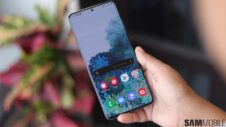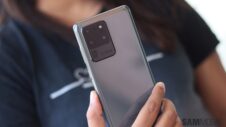The Galaxy S20 Ultra was the last phone I purchased. As I pointed out in another article recently, I’ve been living off of the review units Samsung sends us since the Galaxy Note 20 series launched six months after the Galaxy S20.
I recently ended that streak of using loaner phones and went back to my Galaxy S20 Ultra, and I was impressed by how it was already running Android 13 nearly two months before 2023. I was also impressed by how Samsung seems to have fixed pretty much all of the issues the S20 series had at launch courtesy of the Exynos 990 processor and how the Galaxy S20 Ultra's hardware still holds up pretty well.
However, there's one feature that this phone is sadly missing, one that I wish Samsung had made standard on all Galaxy S20 series phones: 5G support.
While virtually every Galaxy phone in every budget nowadays comes with 5G support, it wasn't the case when the Galaxy S20 series was launched. Samsung sold separate 5G variants of the Galaxy S20, S20+, and S20 Ultra, and they were restricted to select markets.
But at least the S20 and S20+ had their LTE and 5G variants differentiated by their model numbers. That wasn't the case for the S20 Ultra. It launched with the same model number everywhere, suggesting Samsung deliberately withheld 5G support in some markets on a software level rather than it being a hardware limitation.
And I was actually fine with that limitation till a few weeks back. But then, all of a sudden, 5G connectivity became a reality in India, with the country's two biggest carriers basically bringing 5G support to more and more cities on almost a daily basis, and I suddenly realized how the Galaxy S20 Ultra, for all of its awesome features, was not as future-proof as it could have been.
TL;DR: 5G should have been a standard feature on the Galaxy S20 series
Samsung didn't seem to have thought too far ahead, or it underestimated how quickly 5G connectivity would come to markets like India, and likely many other countries. Of course, it could also be that Samsung just wished to keep 5G connectivity exclusive a little while longer so it could force people to upgrade to newer phones. Either way, I find it disappointing as I use my Galaxy S20 Ultra these days.
Again, the Galaxy S20 Ultra holds up well even today as far as the entire package is concerned. But launching it in an LTE-only variant in so many markets was a giant oversight on Samsung's part in my opinion. I want to use 5G if there's a chance, but I'm not willing to upgrade to a newer phone (especially since Samsung — and Android phones in general — don't have great resale value) right now.
I should note that I'm not exactly criticizing Samsung here. 5G, like any new cellular technology, took some time to become as widespread as it is now so it's not surprising some manufacturers decided to cut costs (which resulted in slightly more affordable pricing, at least here in India) by leaving 5G support out of their flagships back then.
And it's not like I need 5G. 4G LTE networks are still plenty fast in my city and can get the job done perfectly well. They also don't use as much battery power, which is another advantage. But at the end of the day, having the option of disabling 5G on the phone myself instead of not having the feature at all would have been a lot better.
It is what it is, though. At least I can take solace in the fact that any future Galaxy flagship — or even a mid-ranger like the Galaxy A53 or A54 — that I purchase won't have the same connectivity limitation. Samsung is making an effort to bring 5G support to lower and lower price points every year, and that's worth applauding, though I do hope the company will jump on the 6G bandwagon (or whatever comes after 5G) much quicker.







